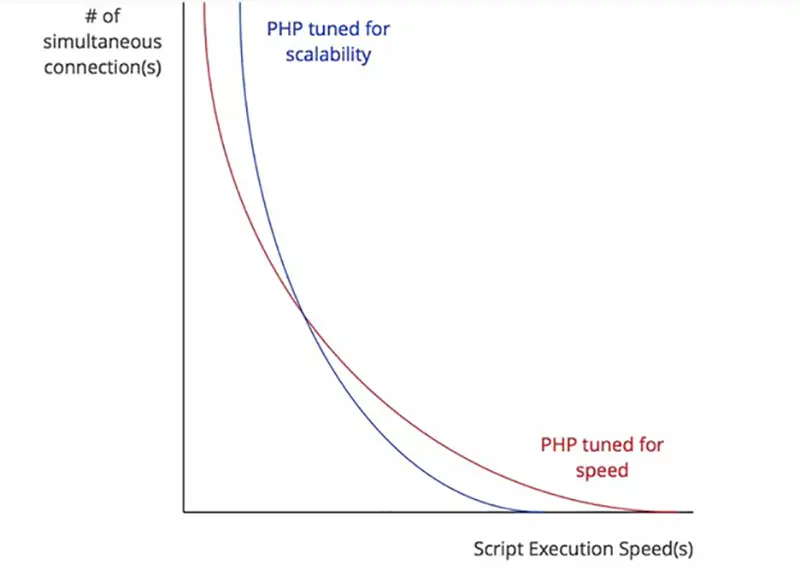Click here to get this post in PDF
Quick Summary: As we all know that programmers love to use the latest version of PHP because it is one of the faster and reliable programming languages compared to other similar platforms. Some of you must be facing major issues when it comes to performance, so here we’ll discuss some amazing tips to improve PHP web application performance.
A brief history of PHP
PHP is a scripting language that was introduced in 1994 by Rasmus Lerdorf. Early unreleased versions were used on his homepage to keep track of who was looking at his online resume. In 1995 the first version used by others was available and it was known as the Personal Home Page Tools.
It is safe to say that several PHP developers in India have overseen various advancements when it comes to enhancing the performance and quality of any given project.
PHP was initially introduced for the developer’s personal use and it was originally an acronym for Person Home Page. In 2000, PHP version 4 was released including an in-memory executor and compiler model that allows PHP to be used for designing dynamic web applications. After five years, in 2015, PHP 7.0 was released with some improvements and updates to the Zend Engine and a reduction in memory usage. PHP 8 was released in 2020 with some breaking changes compared to its previous versions such as just-in-time compilation, syntax changes, addition, the addition of the match expression, standard library changes, and much more. At the time of writing this blog, the latest available version is PHP 8.0.7, which was announced in June of 2021.
In this blog, we’re going to have a look at some amazing tips that will improve the performance of your PHP web application. But before we directly jump on tips, let’s know what exactly is PHP web application performance.
What is PHP Web Application Performance?
Performance is the main factor for every PHP web application. Enhancing the performance of your application is a challenging task, and for that, we have monitoring software that will help you to measure the effects of any modifications or changes you make. Memory usage and speed are the best indicators of performance because they impact page load times, which are important to web applications.
Sometimes users complain about slow loading pages, unresponsive links, and many other factors which result in losing those users as customers. So to satisfy your user’s requirements, performance must be checked and monitored continuously. On top of all of these, make sure that your application must run smoothly. There are numerous ways to do some sort of PHP performance optimization, but here are 7 amazing tips that you must follow to improve the performance of your PHP web application.
What exactly is good PHP performance?
Speed and performance are the two most essential factors for good PHP applications. Achieving optimal performance is a balancing act that needs trade-offs between accuracy, scalability, and speed.
Based on a representation from phplens, here is the image that shows the theoretical trade-off between scalability and speed:
The red line in the above-mentioned image represents a script optimized for speed, and the blue line represents a script that prioritizes scalability. When the number of both these connections goes down (low), the red line runs faster; however, when the number of users grows, the red line becomes slower. When there is an increase in traffic, the blue line slows down; however, the decline is not as drastic, so the connection/script tuned for speed slows down than the script tuned for scalability after a certain threshold.
PHP web Application Performance Monitoring and Optimization Tips
1. Use JSON instead of XML
Native PHP functions like json_decode() and json_encode() are incredibly fast, that’s why using JSON is preferable to using XML. If you’re already using XML, then make sure you are avoiding the use of DOM manipulation, and instead of that start using regular expressions.
2. Update PHP Version
The PHP development community and developers always come up with the latest and new versions of PHP. So, it is recommended by many professionals and experts to upgrade your web applications to the latest versions. Contributors are now working hard to optimize PHP performance and introducing security updates and better performance.
If you are still stuck in the older version, update that ASAP to the latest PHP version. According to Zend resources, eCommerce platforms like Magento and Shopify (CMS) run 3x faster and Drupal 8 runs 75% faster.
3. Minify Static Scripts
As we all know, for PHP web application development, PHP uses scripts like HTML and CSS to develop an entire web application. Not only PHP, but these scripts also contribute a major role in web application execution.
Minifying static scripts will allow you to cut down on the entire processing time and perform standard steps like merging, refreshing JavaScript, CSS files, Load order optimization, reduced server requests, reduce downloadable components, and much more. So, it is required to execute a manual technique every time.
4. Minimize HTTP requests
According to research conducted by Yahoo, more than 70% of a web page’s load time is invested in downloading the different parts of the page, like images, scripts, and stylesheets. An HTTP request is made for each element, so the more on-page components, the longer it takes for the page to render.
Figuring out how many your website currently makes to use as a benchmark, is the first step to minimize your request for better PHP application performance. If you’re using Google Chrome, you are free to use the browser’s developer tools.
5. Cut out unnecessary calculations
When you’re using the same value of a variable more than once, calculate the value at the beginning rather than performing a calculation for every use.
6. Deploy PHP on Cloud Hosting
After the completion of development on dev servers, the next step is to deploy PHP web applications onto the hosting servers. As we all know, hosting is one of the main parts of the development process and it plays a major role in the speed and performance of PHP applications.
7. Improve Code for Better Process
At last, we all know that improving code is another most important thing to do for performance optimization. Make sure to eliminate writing messy and complex code and try to optimize it by using more native functions.
Make sure to use JSON data types rather than only XML. Do not repeat variable declarations, always use isset() as it is much faster.
Wrapping Up
Hey techies, here we discussed 7 amazing tips that will help you to improve the performance of PHP web applications. Nowadays more than 60% of web development companies are fond of using PHP development for one or the other reason to make their application run smoother and faster. So, make sure to follow such tips to enhance the performance of your existing app as well as to make a great customer experience.
Are you planning to develop a PHP web application with excellent speed, performance, and better customer experience? If yes, then search for the best PHP web development company that offers top-notch developers with great expertise and start your project today!
You may also like: 5 Ways Web Application Performance Issues Can Impact Your Business Results
Image source: elements.envato.com


